ChatGPT: A year of triumph, turmoil, and AI evolution
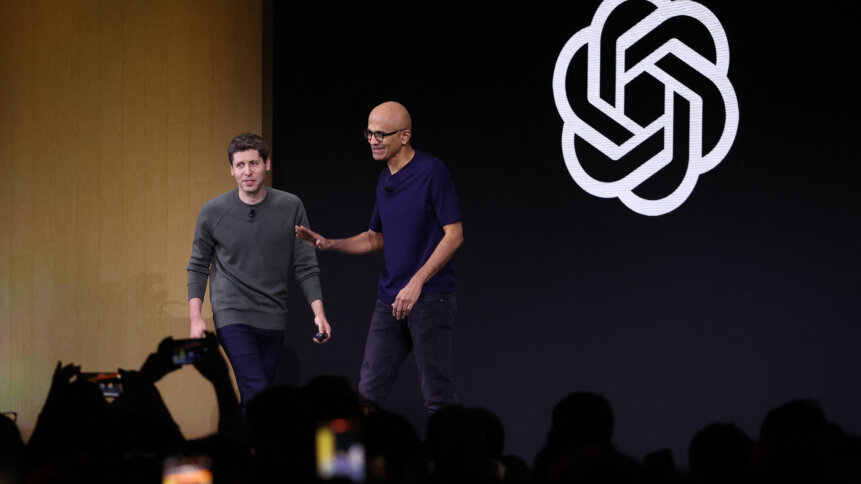
|
Getting your Trinity Audio player ready...
|
• ChatGPT has revolutionized both AI and the world in the space of a year.
• But it’s been a year of mingled triumph and difficulty, including phophecies of doom.
• ChatGPT ended its first year caught up in a personnel wrangle at OpenAI.
In the ever-evolving landscape of AI, OpenAI has carved a definitive path with its groundbreaking chatbot, ChatGPT. The sensational chatbot emerged on the scene on November 30, 2022, heralding what many described as a breakthrough year for AI. OpenAI’s mission was clear from the outset — to advance AI responsibly and ensure its benefits reach all of humanity. ChatGPT was envisioned not just as a technological advancement but as a tool to engage users and push forward the dialogue on AI’s potential – and its ethical implications.
November 2023 marked a significant milestone for OpenAI. The 12-month anniversary was more than a standard landmark; it symbolized a paradigm shift in chatbot technology, surpassing previous accomplishments in the field.
But the month took an unexpected turn when, on November 17, 2023, the board at OpenAI suddenly ousted Sam Altman, co-founder and CEO of the company, and widely regarded as “the face of generative AI.”
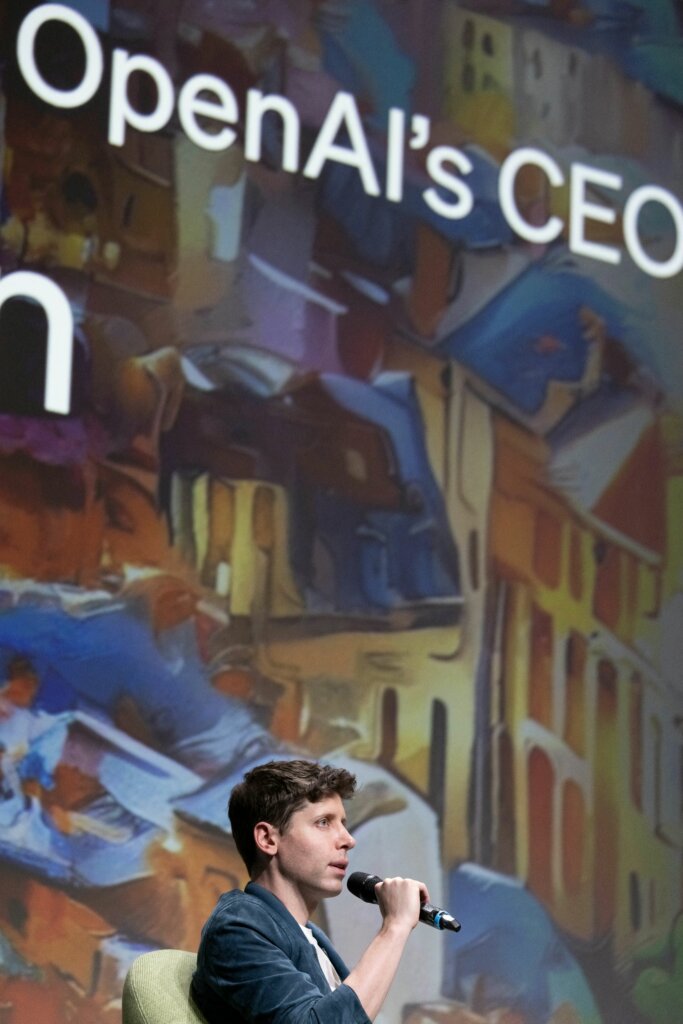
Altman’s shock departure “follows a deliberative review process by the board, which concluded that he was not consistently candid in his communications with the board, hindering its ability to exercise its responsibilities,” a statement said. (Photo by JOEL SAGET / AFP).
The board cited concerns about Altman’s honesty in communications as the reason behind its abrupt and unforeseen decision. The tumultuous five-day period that followed captivated Silicon Valley – and the world – with its descent into corporate soap opera, including an eventual restoration to the previous norm after extensive feedback from both fans and staff at the company.
OpenAI, the world’s leading AI company, was teetering on the brink of collapse amid an internal power struggle just days before its first anniversary.
Initially, the reason for Altman’s firing was unclear. Later, Altman disclosed that he was dismissed for criticizing OpenAI’s direction and advocating for a greater focus on artificial general intelligence (AGI). OpenAI has aimed to develop AGI, a theoretical form of AI that can safely perform any intellectual task like a human.
“If AGI is successfully created, this technology could help us elevate humanity by increasing abundance, turbocharging the global economy, and discovering new scientific knowledge that changes the limits of possibility,” Altman said in a February 2023 blog post.
He acknowledged though that the development of AGI also carried serious risks, such as misuse, accidents, and societal disruptions.
Despite these concerns, halting AGI development is neither possible nor desirable, Altman emphasized, adding that it has not been OpenAI’s plan. For context, there is a school of thought within OpenAI thatespouses getting new research into the real world through products (like ChatGPT), so as to better understand their benefits and risks in the wild.
Altman was enthusiastic about building on ChatGPT’s success and launching new products to ride the chatbot phenomenon’s wave of momentum. He later revealed that he was fired because he had been critical of OpenAI’s direction, pushing the company to focus more on developing AGI.
How such an explanation squares with the initial reasons given by the board is a puzzle for the ages – it appears not to be something being actively pursued right now
In that same February 2023 blog post, Altman said that to prepare for AGI, OpenAI would need to deploy increasingly powerful systems to gain real-world experience gradually. ‘A gradual transition to a world with AGI is better than a sudden one. We expect powerful AI to make the rate of progress in the world much faster, and we think it’s better to adjust to this incrementally,” Altman noted.
Altman’s firing has raised concerns about the direction of OpenAI and the role of its board in shaping the company’s future – while establishing him as the Teflon executive, too necessary to the forward momentum of a technological revolution ever to get rid of.
Should a boardroom tussle be a defining moment for OpenAI?
Truth be told, the dramatic, failed, boardroom coup is of no moment compared to the dramatic rise of ChatGPT and how it has revolutionized AI for the world. Many casual observers won’t know that OpenAI introduced ChatGPT in a “low-key research preview,” partly influenced by a competitive atmosphere with AI startup Anthropic. While earlier chatbots were often bothersome, ChatGPT became a sensation with its straightforward user interface and natural-sounding human-like response.
The rapid rise in its popularity was evident early, as ChatGPT exceeded one million users within five days of its launch, according to Greg Brockman, the CEO of OpenAI at that time. Starting as a simple, free-to-use, web-based, and chat-centric interface built upon OpenAI’s existing model, GPT-3.5, ChatGPT as a chatbot evolved into the company’s most successful product.
READ NEXT

New horizons with OpenAI GPT updates
OpenAI’s commitment to at least partial public engagement has been key to the first year of ChatGPT. The chatbot was introduced in stages, allowing users to interact with the evolving technology while OpenAI navigated the balance between openness and responsible AI use. The organization actively sought external input, contributing to the model’s improvements and underscoring its dedication to ethical AI development. But on the other hand, it rejected the opportunity to allay fears about the nature and scope of the ChatGPT training data by publishing that data, as Google did for Bard, citing “business reasons.”
ChatGPT It also holds the distinction of being the fastest-growing consumer app in history. And one year on from the public launch of ChatGPT, the excitement surrounding generative AI remains intense – and is in fact growing.
Tech giants continue to invest billions of dollars in technology, nations are stockpiling chips for future AI goals, and the discussions on generative AI’s promise and challenges are still being debated in boardrooms, households and governments worldwide.
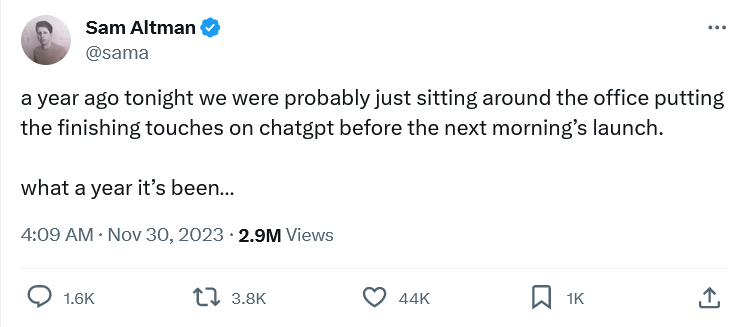
Those final checks…
To top it off, over the last 12 months, schools have alternately prohibited and allowed the service. Regulators convened hearings and summits on AI, while writers and actors staged strikes, expressing fears that AI could diminish the value of their contributions – especially when studios proposed creating AI clones of actors and then using those clones in perpetuity without any further remuneration to the actors themselves.
Additionally, industry leaders (including two of the three “Godfathers of AI”) endorsed a brief statement highlighting “the risk of extinction from AI.”
Yet, neither businesses nor individuals are slowing down on their usage of the new technology. Recent data reveals that the mobile app versions of ChatGPT have surpassed 110 million combined installations and recorded nearly US$30 million in consumer spending. This information comes from a market analysis provided to TechCrunch by the mobile intelligence provider data.ai. Today, the excitement surrounding AI has reached well beyond the boundaries of the tech industry.
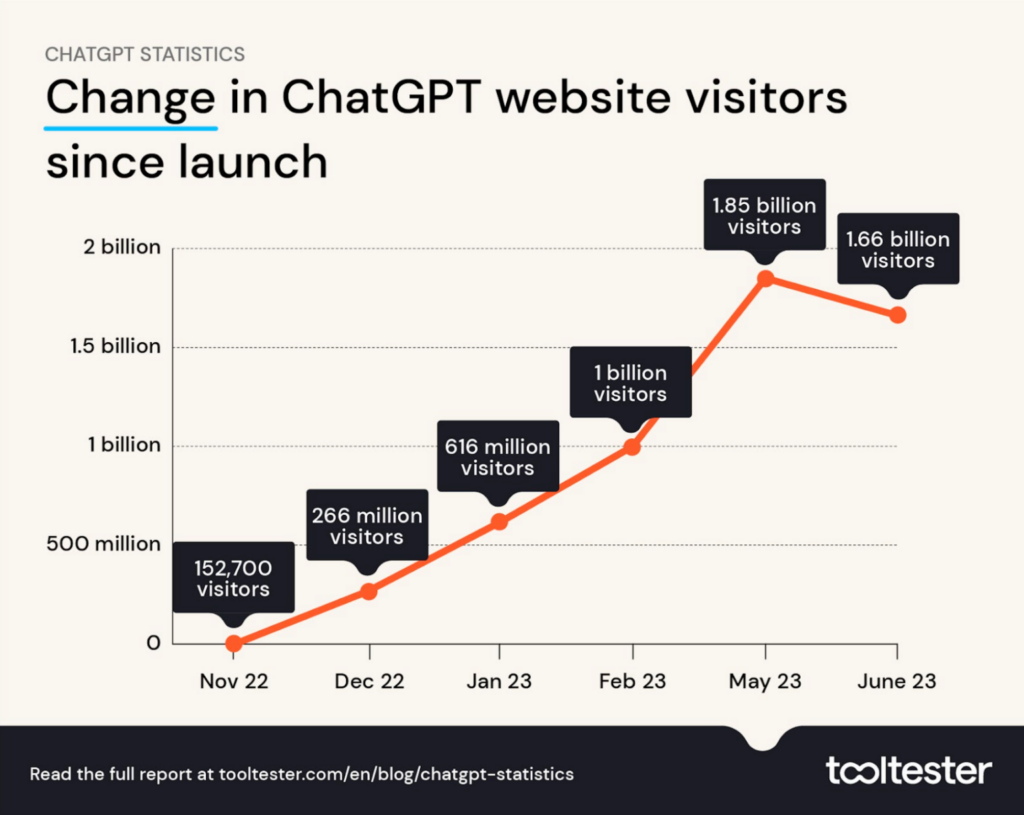
The changes in ChatGPT users over the first year proves that people continue to find new ways to use the AI. Source: SimilarWeb
Since the debut of ChatGPT, there has been a 20-fold increase in jobs with AI mentioned in the title or job description, as per a November report from the job site Indeed. Notably, these roles are not confined to the tech industry alone. That said, while ChatGPT initiated the surge in interest around generative AI, the market extends well beyond the OpenAI chatbot.
Businesses and regular users have an expanding array of AI chatbots from which to choose, including Bard, Claude, Pi, Grok, and the latest addition, Q, from Amazon. That shows how revolutionary ChatGPT has been.
What can an AI chatbot like ChatGPT do today compared to a year ago?
Since its launch, OpenAI has introduced more powerful AI models, the option to build customized ChatGPT experiences, and a feature that lets the chatbot respond to spoken words. The primary and evident enhancement in its capabilities though lies in the fact that the models used today have evolved into what are known as multimodal models.
Unlike a year ago when we had ChatGPT, which processed text input and generated text as a response, the current models can handle various information such as text, images, video, and voice data, providing corresponding outputs in a multimodal fashion. Then came the recent Developer Day update, where OpenAI announced that the chatbot system’s world knowledge has been refreshed to April of this year, giving users information closer to real-time.
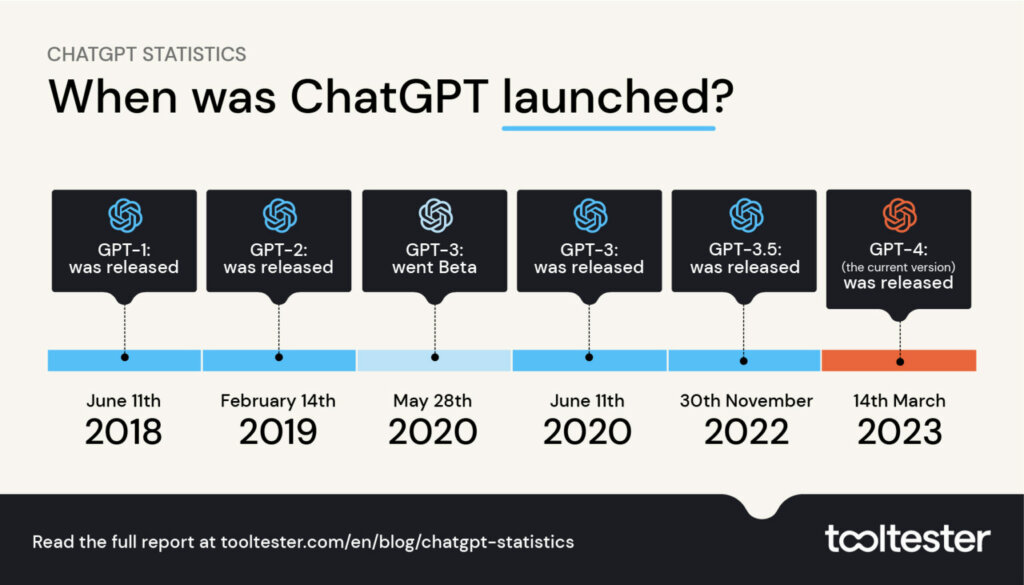
The original version, GPT-1 was released on June 11th 2018, with the most recent iteration, GPT-4 being released on March 14th 2023. Sources: OpenAI, Venture Beat.
The system has also integrated with Microsoft Bing, delivering truly real-time information, a capability which wasn’t possible when ChatGPT was first launched. The landscape of generative AI has undergone a transformative journey in the past year. From the unprecedented success of ChatGPT to the rise of interest among tech giants, the field has expanded and matured.
The rapid evolution witnessed in multimodal capabilities, real-time updates, and the proliferation of AI chatbots beyond ChatGPT exemplify the relentless advancement within the generative AI domain.
As we reflect on this transformative year, it’s clear that the impacts of generative AI extend far beyond its technological prowess, influencing industries, shaping debates, and redefining the way we interact with AI.
Care to speculate where we’ll be at the end of Year 2?









